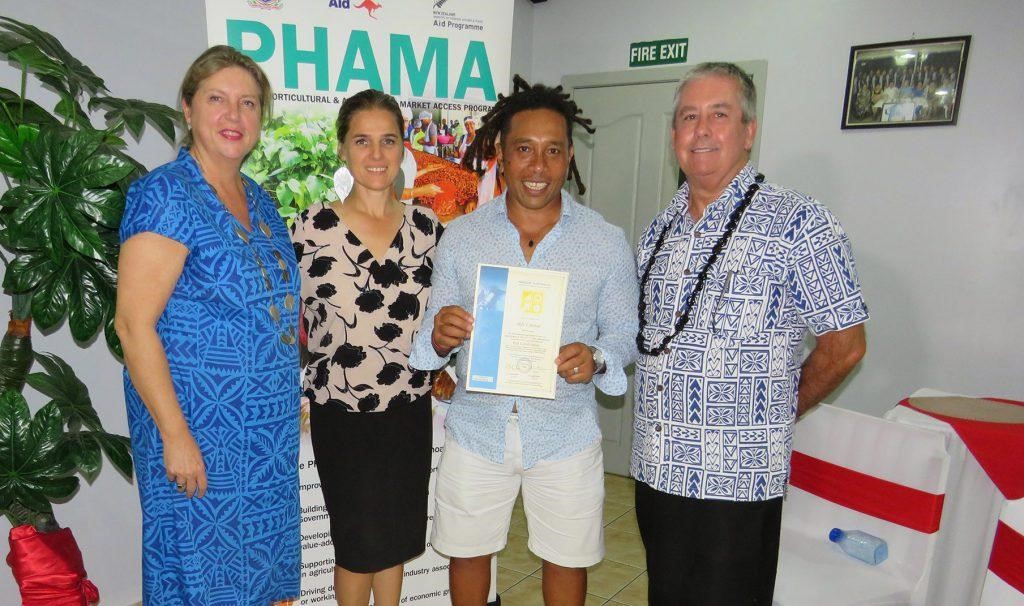Food Safety Certification, a Prerequisite for Trade
Information included on the label of food products has the power to take food products places, says Anisi Bloomfield.
Bloomfield is the chief executive officer of North Star Fishing Company Limited in Nukualofa, Tonga. Last year his company became the first fisheries business in Tonga to be Hazard Analysis and Critical Control Point (HACCP) certified. Meaning that the company successfully met international standards of food safety and quality management system, allowing it to export to target markets.
“We’ve been in the business since 2013. We catch deep sea fish, process it according to the requirements of the United States and Australian markets and then export. We knew that getting certification would be important for the future of the company especially for exports. We never thought we’d get HACCP certification because we were new but we were committed to getting our facility up to the standards required by HACCP Australia and we made every effort to comply with their requirements,” he said.
HACCP is a management system that minimises or eliminates risks to food safety. It helps to identify, address and prevent hazards throughout the production process and applies a preventative approach to minimising food hazards. For Bloomfield’s company, carrying the HACCP seal on their product label means they can export to the United States and Australia. It also means they’re able to expand their current client base in both countries.
Prior to being HACCP certified, Bloomfield said their products were packaged at the Tonga National Fisheries Council packing facility which was recognised by the US and Australian markets. “One of the immediate benefits for us is that now we don’t have to go to any packing facility,” he said.
Bloomfield acknowledged the Pacific Horticultural and Agricultural Market Access (PHAMA) Program for helping the company get certification. Funded by the Australian and New Zealand governments, PHAMA is an aid for trade program that provides practical and targeted assistance by developing the capacity of public and private sectors to meet export market requirements.
“PHAMA coordinated with HACCP Australia and that helped to speed the process for us. The real need here is to have someone do the coordinating otherwise we would still be trying to get certification. We were fortunate that PHAMA stepped in to help us and made arrangements,” he explained.
Importance of food safety certification
Food safety standards aim to lower the incidence of foodborne illnesses by placing obligations on food businesses to produce food that is safe for consumption.
With heightened awareness stemming from high-profile food recalls and consumers becoming more health conscious, food safety certification has become a prerequisite for trade. Consumers and markets can be confident that a food business has successfully met the requirements of a national or internationally recognised best practice approach. Certification by an objective third party, referred to as accredited certification, signifies good governance and corporate responsibility.
Growers, processors and exporters are required to comply with the food safety standards of countries they supply. Compliance often means undergoing a series of inspections to determine the hygienic conditions of a facility, its equipment and processing methods of food products.

PHAMA’s support
Since its establishment in 2011, PHAMA has worked to strengthen the capacity of public and private sector counterparts through Market Access Working Groups and Industry Working Groups which bring members of the public and private sectors together to discuss market access challenges. The program has been supporting accredited food safety certification initiatives for export businesses in Fiji, Papua New Guinea, Tonga, Samoa and Solomon Islands as a means of ensuring continued market access for produce from the Pacific.
PHAMA has helped businesses like Aroma Coconut Products in PNG, Kokonut Pacific Solomon Islands (KPSI), Pacific Oil in Samoa and taro exporters in Fiji like Ben’s Trading and Food Processors Fiji to tap into the export market or expand their client base through food safety certification processes.
For Aroma Coconut Products in PNG, the lack of food safety certification meant retail was limited to the domestic market. Business owners Geno Genolamar and his wife Kellin sought to acquire food safety certification but the process proved challenging and costly for a small to medium enterprise like theirs. They were able to acquire HACCP accreditation after PHAMA stepped in to assist them.
In the Solomon Islands, PHAMA supported the country’s fisheries industry with training and technical support to develop HACCP systems and undertake training on food safety management, including capacity building initiatives for the Competent Authority (Health). This support strengthened the country’s market access position to the European Union.
In August 2017, Kokonut Pacific Solomon Islands, a local producer of virgin coconut oils and soap products in the Solomon Islands, became the second company in the country to achieve HACCP certification through PHAMA’s support.
In Samoa, PHAMA provided technical advice and support to Pacific Oil. This helped the company gain access for its copra meal exports to Australia. The company was also able to acquire HACCP accreditation as a result of PHAMA’s support.
In Fiji, PHAMA funded a HACCP specialist to train and advise leading taro exporters Ben’s Trading and Food Processors Fiji on the improvements to businesses processes and infrastructure. PHAMA also helped the exporters through formal HACCP audit and accreditation processes. By supporting the exporters to become HACCP certified, PHAMA helped open up new higher-priced markets which benefit 37,000 taro-farming households in Fiji. HACCP accreditation has also had a direct impact on contract prices for the exporters.
PHAMA’s support for Pacific export businesses to acquire accredited food safety certification is aligned with the program’s priorities to support firm’s to meet export regulations, including compliance with international food safety standards. The program has now entered a new phase, PHAMA Plus, that builds on the foundation established by PHAMA and continues to support access to diverse export markets. PHAMA Plus will continue to support food safety certification initiatives for Pacific export businesses.
-ENDs-
